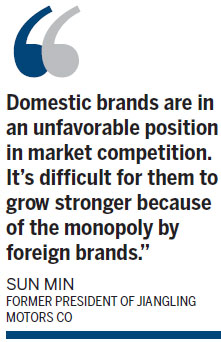Mixed reaction to mixed ownership reform of SOEs
Updated: 2014-04-20 08:05
By Fu Chao(China Daily)
|
|||||||||
To foster homegrown brands, China's State-owned auto groups must open to private investments, said Zhao Fuquan, head of the automotive research center at Beijing's Tsinghua University.
During the China Automotive Blue Book Forum on April 12 in Beijing, Zhao and industry insiders discussed the "mixed-ownership" economy and its impact on the automotive industry.
Restructuring State-owned enterprises into mixed-ownership companies has been on the government's agenda since last year, according to participants of the forum.
In his government work report during the National People's Congress session in March, Premier Li Keqiang said that SOEs should further reform by developing mixed ownership.
Insiders said nearly half the equity of China's SOEs could be purchased by private or other investors.
Sun Min, former president of Jiangling Motors Co, said that the organization structures and operational modes of SOEs were usually problematic.
He said executive positions are often filled by former government officials, who are not necessarily good at corporate management or familiar with market operations.
The founder of Jiangling Motors said that the Chinese auto market was crowded with too many brands.

"Domestic brands are in an unfavorable position in market competition. It's difficult for them to grow stronger and even bigger because of the monopoly by foreign brands," he said.
Sun said for domestic brands to grow, mergers and acquisitions were needed to better allocate resources. He said because most of the State-owned automakers are controlled by governments, mergers and acquisitions were very difficult.
"The mixed ownership at these auto companies should be the right solution to the problem," he said.
Sun Jian, an analyst for the automotive industry at consulting company AT Kearney, said the crucial part of the reform is how to encourage executives of State-owned auto companies to have the initiative to develop their own brands and embrace market competition.
The country's carmakers have worked with foreign counterparts in joint ventures for a long time.
According to a report from the China Association of Automobile Manufacturers, of the top 10 car brands by sales, eight were joint ventures.
Executives of State-owned auto companies, satisfied with the profits from their joint ventures, often do not have the motivation to focus on development and growth of domestic brands, according to Sun Jian.
He said mixed ownership of SOEs through diversified investors would lead to fundamental changes in the decision-making process of companies.
"With the ownership reform, company decision makers will be likely to shift their focus from the joint ventures with foreign automakers. They have to foster and strengthen their indigenous brands according to the interests of other domestic shareholders," said Zhao Fuquan from the Tsinghua University's automotive research center.
"No matter what kind of ownership, the companies should operate according to market rules," he added.
Some executives, from both State-owned and private auto companies, were not as optimistic about the ownership reform.
Xu Heyi, chairman of the State-owned Beijing Automotive Group, said during the Boao Forum for Asia earlier this month, that the group's core assets would not be open to private investors and that it would take a long time to carry out mixed-ownership reform.
According to a report on news portal Sina.com, entrepreneurs from privately owned companies show little interest and confidence in the opening up. Some entrepreneurs were quoted saying that if they cannot access core assets of SOEs investment may not be worthwhile.
fuchao@chinadaily.com.cn
(China Daily 04/20/2014 page42)